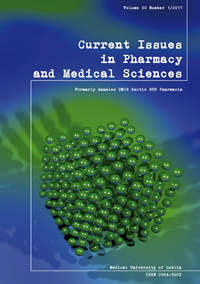Fragile X syndrome – a common disease rarely diagnosed
DOI:
https://doi.org/10.1515/cipms-2017-0006Keywords:
Fragile X syndrome, full mutation, intellectual disabilityAbstract
Fragile X syndrome (FXS) is a single-gene disorder with a broad spectrum of involvement, including cognitive and behavioural impairments of varying degrees with specific physical features and with strong association with autism. The study was conducted on 23 males (10-32 years old) who had full mutation in the FMR1 gene. A complete medical evaluation, including medical history, family history, psychological testing and physical examination was conducted on each subject. Three of the FXS patients (13%) were isolated cases of mental retardation in the family. The remaining 20 FXS patients belonged to 15 families, where there were other mentally retarded family members present. The degree of mental retardation (MR) varied. Mild MR was diagnosed in 1/23 (4.35%), moderate MR in 12/23 (52.17%), severe MR in 10/23 (43.48 %). Moreover, autism spectrum disorder was diagnosed in 5/23 (21.74%) FXS patients. Analysis of the BMI showed that in FXS patients, 14 of 23 (60.68%) had too high body weight - 9/23 (39.13%) were overweight and 5/23 (21.74%) were obese. The diagnosis of FXS is difficult because of nonspecific symptoms, yet early diagnosis is crucial for early intervention and genetic counseling. The risk of recurrence is 50%.
References
1. Bailey D.B. et al.: No change in the age of diagnosis for fragile X syndrome: findings from a national parent survey. Pediatrics, 124, 527, 2009. [Web of Science]
2. Bailey D.B., Raspa M., Olmsted M.G.: Using a parental survey to advance knowledge about the nature and consequences of Fragile X syndrome. A.J.I.D.D., 115, 447, 2010.
3. Chonchaiya W., Schneider A., Hagerman R.J.: Fragile X: a family of disorders. Adv. Pediatr., 56, 165, 2009.
4. Cornish K., Turk J., Levitas A.: Fragile X syndrome and autism: common developmental pathways? Current. Pediatrics. Reviews., 3, 61, 2007. [Crossref]
5. De Rubeis S., Bagni C.: Regulation of molecular pathways in the Fragile X syndrome: insights into Autism Spectrum Disorders. J. Neurodevelop. Disord., 3, 257, 2011. [Crossref]
6. Gabis L.V. et al.: Psychiatric and autistic comorbidity in Fragile X syndrome across ages. J. Child. Neurol., 26, 940, 2011. [Web of Science] [Crossref]
7. Hagerman R.J. (2002). The physical and behavioral phenotype. In: Fragile X syndrome: Diagnosis, Treatment and Research. Hagerman R.J., Cronister A., (editors). Baltimore, MD: Johns Hopkins University Press. p.3.
8. Hagerman R.J.: Lessons from fragile X syndrome regarding neurobiology, autism and neurodegeneration. J. Dev. Behav. Pediatr., 27, 63, 2006.
9. Hersh J.H., Saul R.A., COMMITTEE ON GENETICS.: Clinical report - health supervision for children with fragile X syndrome. Pediatrics, 127, 994, 2011.
10. Hessl D. et al.: A solution to limitations of cognitive testing in children with intellectual disabilities: the case of fragile X syndrome. J. Neurodev. Disord., 1, 33, 2009. [Web of Science]
11. Hunter J. et al.: Epidemiology of FXS: a systemic review and metaanalysis. Am. J. Med. Genet., 164, 1648, 2014.
12. Johnson V.A.T.: Assessment of FMR1 gene mutation at-risk status in young children. Newborn & Infant Nursing Reviews, 8,10,2008.
13. McConkie-Rosell A., Finucane B., Cronister A.: Genetic counseling for fragile X syndrome: updated recommendations of the National Society of Genetic Counselors. J. Genet. Counsel., 4, 249, 2005. [Crossref]
14. Turk J.: Fragile X syndrome: lifespan developmental implications for those without as well as with intellectual disability. Curr. Opin. Psychiatry, 24, 387, 2011. [Web of Science]
15. Visootsak J. et al.: Fragile X syndrome; an update and review for the primary Pediatrician. Clin. Pediatr. (Phila), 44, 371, 2005.
Downloads
Published
Issue
Section
License
Copyright (c) 2017 Authors

This work is licensed under a Creative Commons Attribution-NonCommercial-NoDerivatives 3.0 Unported License.


